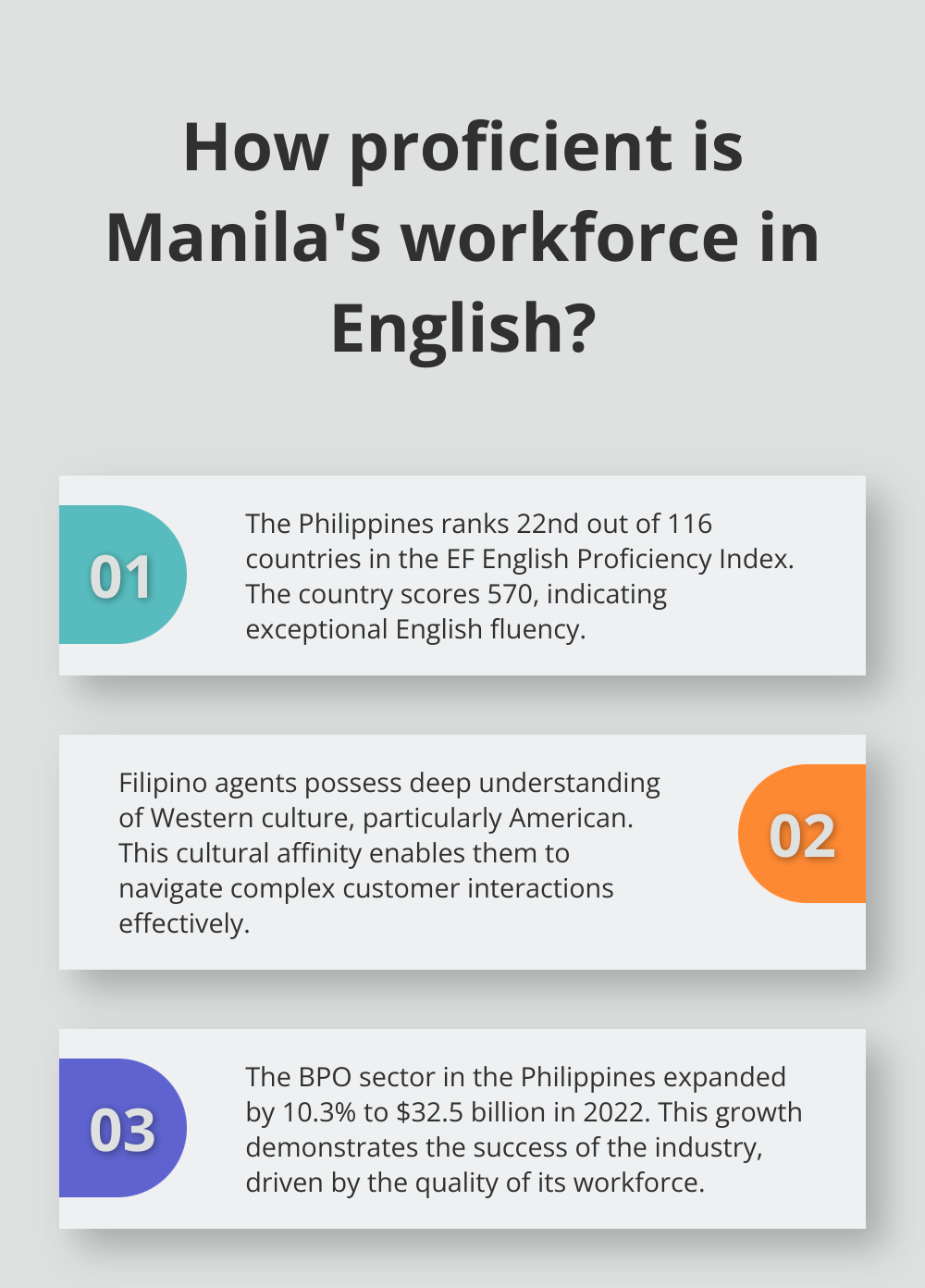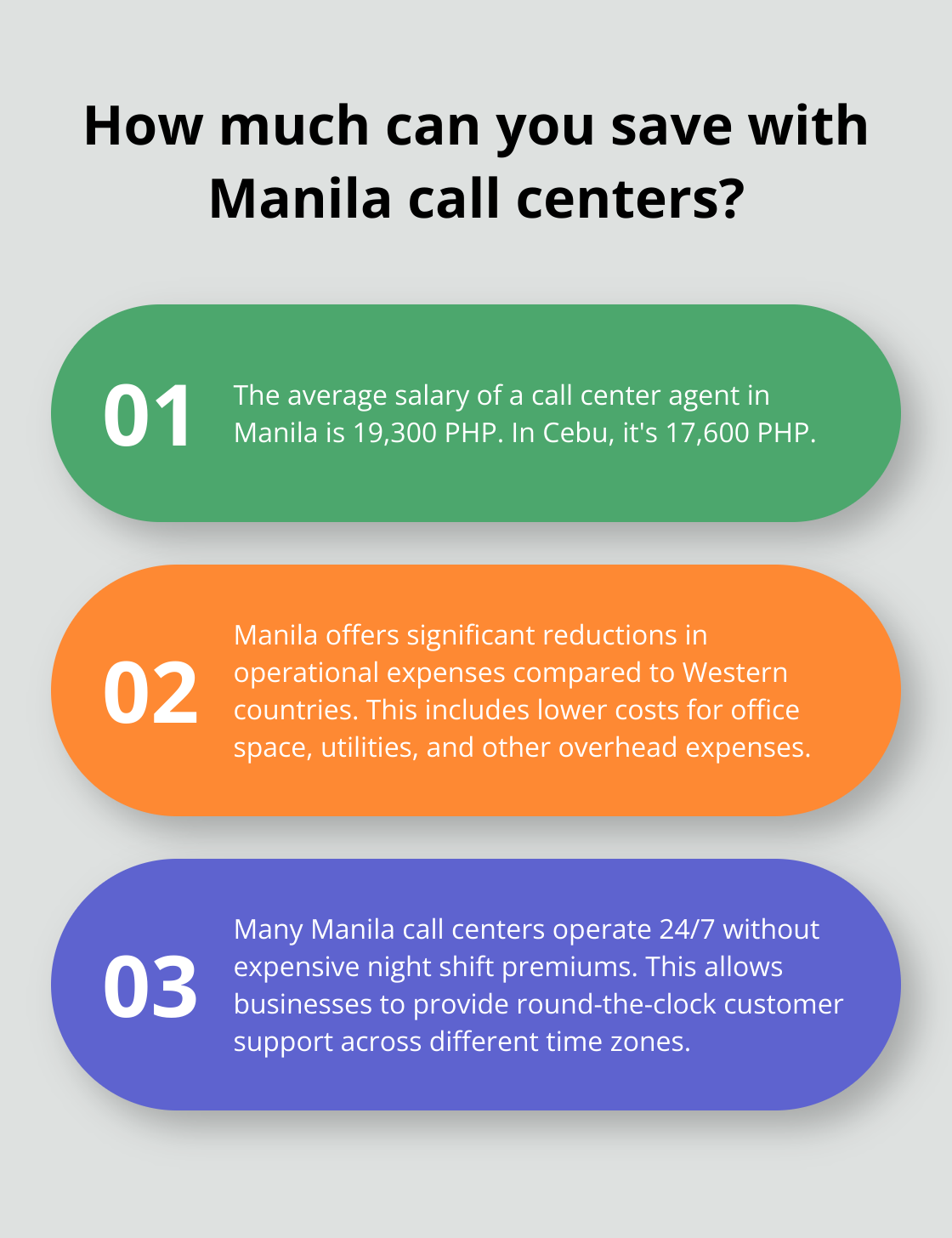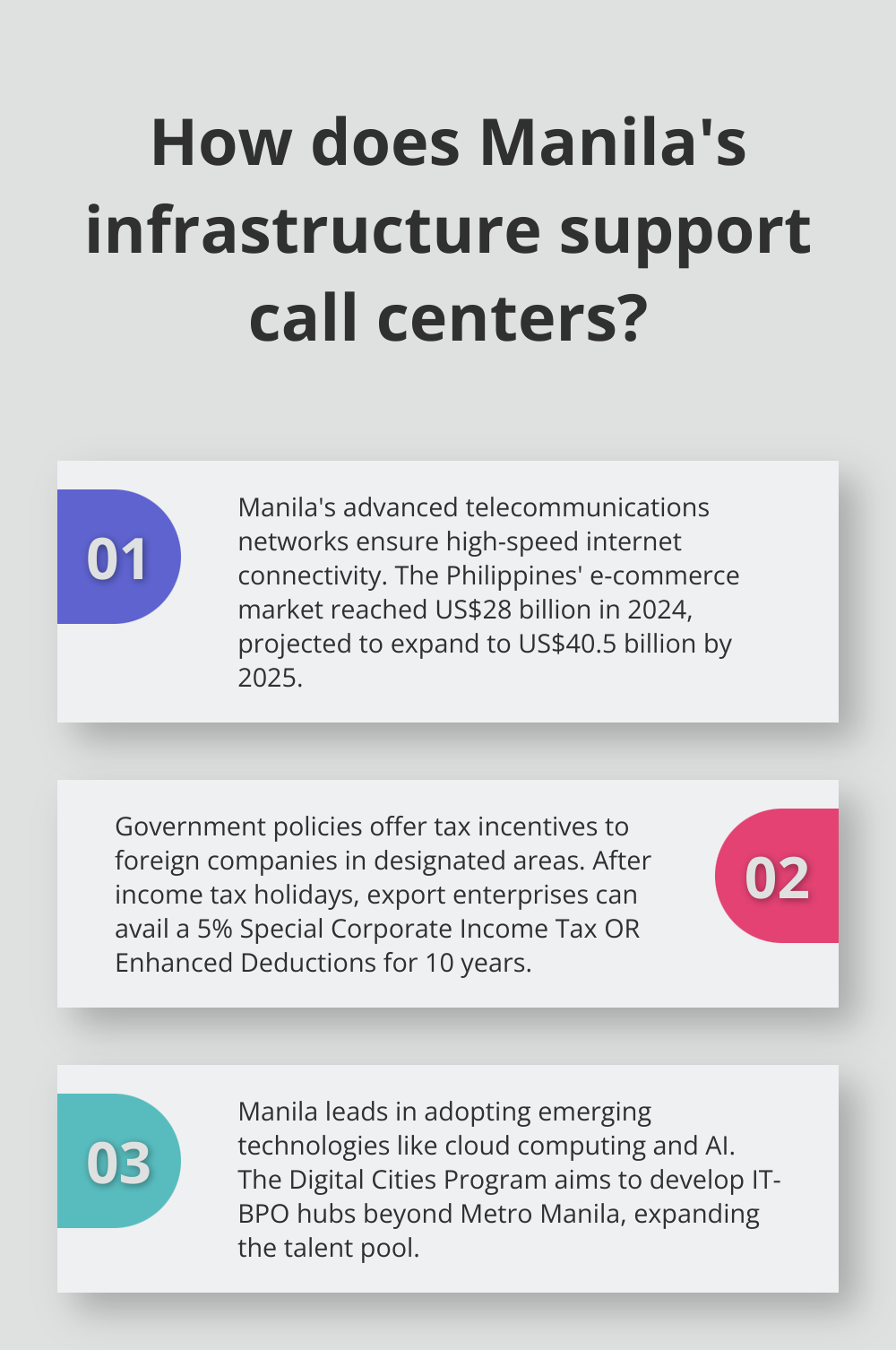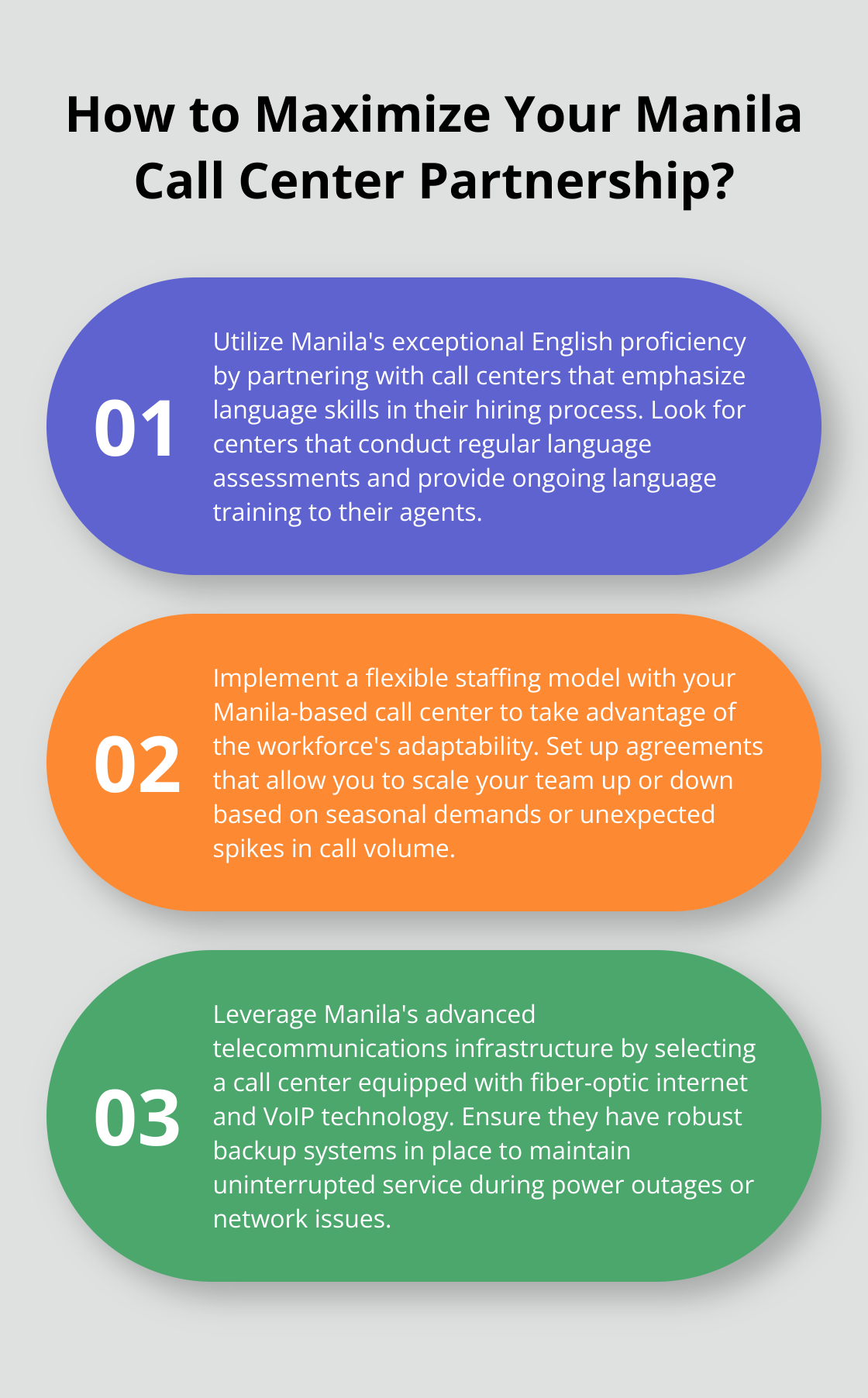Manila’s talent pool is a goldmine for call centers, offering unique advantages that often go unnoticed.
At Outsource Consultants, we’ve seen firsthand how businesses can benefit from tapping into the Philippines and Manila’s rich customer service resources.
From high English proficiency to cost-effectiveness, Manila’s workforce brings a wealth of benefits to the table.
What Makes Manila’s Workforce Stand Out?
Manila’s workforce stands as a beacon of talent in the global call center industry, offering unique qualities that set it apart. Businesses partnering with Manila-based call centers often experience significant improvements in their customer service operations.
Exceptional English Proficiency and Cultural Understanding
Manila’s workforce boasts exceptional English proficiency. The EF English Proficiency Index ranks the Philippines 22nd out of 116 countries, with a score of 570. This high level of English fluency translates to clear, effective communication with customers from English-speaking countries.

Filipino agents possess a deep understanding of Western culture, particularly American culture, due to the country’s historical ties with the United States. This cultural affinity allows them to navigate complex customer interactions with ease, picking up on nuances and context that might elude agents from other regions.
Unmatched Dedication and Work Ethic
Filipino workers have earned a reputation for their strong work ethic and dedication. This commitment to excellence is deeply rooted in Filipino culture, where values like respect, responsibility, and perseverance take center stage. As a result, businesses often report higher productivity levels and lower absenteeism rates when working with Manila-based call centers.
The IT and Business Process Association of the Philippines (IBPAP) reported that the BPO sector in the Philippines expanded by 10.3% to $32.5 billion in 2022. This growth serves as a testament to the industry’s success, driven by the quality of its workforce.
Remarkable Adaptability in a Dynamic Industry
The call center industry evolves constantly, with new technologies and customer service approaches emerging regularly. Manila’s workforce has demonstrated remarkable adaptability in this dynamic environment. Many BPO companies in the Philippines invest heavily in training programs, ensuring that their agents stay up-to-date with the latest industry trends and technologies.
The adoption of AI and automation in call centers has been swift in Manila. Agents quickly learn to work alongside chatbots and other AI tools, enhancing their efficiency and allowing them to focus on more complex customer issues.
This adaptability extends to work arrangements as well. The COVID-19 pandemic accelerated the adoption of remote work in the Philippines, with many call center agents transitioning seamlessly to work-from-home setups. This flexibility has proven invaluable for businesses looking to maintain continuity in their customer service operations.
The unique combination of language skills, cultural understanding, work ethic, and adaptability makes Manila’s workforce a powerhouse in the call center industry. These qualities contribute significantly to the cost-effectiveness of outsourcing to Manila, which we will explore in the next section.
The Cost-Effective Edge of Manila Call Centers
Significant Labor Cost Savings
Manila’s call center industry offers an unbeatable combination of quality and affordability. The most immediate advantage of outsourcing to Manila is the substantial reduction in labor costs. The average salary of a customer center agent in Manila is 19,300 PHP, while in Cebu it’s 17,600 PHP. This translates to potential savings on labor costs compared to Western countries.

These savings don’t compromise quality. Filipino agents are often college graduates with strong English skills and a deep understanding of Western culture, ensuring high-quality customer interactions despite the lower costs.
Operational Cost Reductions
Beyond labor, businesses can expect significant reductions in operational expenses when outsourcing to Manila. The lower cost of living in the Philippines means that office space, utilities, and other overhead costs are considerably less than in Western countries.
Moreover, many call centers in Manila operate 24/7, allowing businesses to provide round-the-clock customer support without incurring expensive night shift premiums common in Western countries. This 24/7 capability is particularly valuable for businesses serving global markets across different time zones.
High Return on Investment
The combination of lower costs and high-quality service leads to an impressive return on investment for businesses outsourcing to Manila. Many companies report not only cost savings but also improvements in customer satisfaction scores and operational efficiency.
Scalability and Flexibility
Manila call centers offer unparalleled scalability and flexibility. Businesses can quickly ramp up or down their operations based on demand, without the need for long-term commitments or expensive infrastructure investments. This flexibility is particularly valuable for businesses with seasonal fluctuations or rapid growth trajectories.
The cost-effectiveness of Manila call centers, combined with their high-quality service, makes them an attractive option for businesses of all sizes. This value proposition is further enhanced by the robust technological infrastructure and supportive government policies in the Philippines, which we will explore in the next section.
How Manila’s Infrastructure Supports Call Centers
Advanced Telecommunications Networks
Manila stands at the forefront of telecommunications infrastructure in Southeast Asia. Major telecom providers have made substantial investments in fiber-optic networks, ensuring high-speed internet connectivity (essential for seamless call center operations). The Philippines’ e-commerce market reached US$28 billion in 2024, with projections indicating it will expand to US$40.5 billion by 2025, highlighting the country’s growing digital economy.

These advanced networks support Voice over Internet Protocol (VoIP) technology, a cornerstone of international call centers. The reliability and clarity of VoIP calls from Manila-based centers often match or surpass those of their Western counterparts, ensuring high-quality customer interactions.
Government Policies Promoting BPO Growth
The Philippine government has implemented several policies to support the growth of the Business Process Outsourcing (BPO) sector, including call centers. The Philippine Economic Zone Authority (PEZA) offers tax incentives to foreign companies that establish operations in designated areas. These incentives include:
- Income tax holidays
- Duty-free importation of capital equipment
- Simplified import and export procedures
After the income tax holiday, export enterprises can avail a 5% Special Corporate Income Tax OR Enhanced Deductions for 10 years.
The government has also established the IT and Business Process Association of the Philippines (IBPAP) to promote the country’s BPO industry. IBPAP collaborates closely with the government to address industry challenges and develop strategies for sustained growth.
Ongoing Digital Infrastructure Improvements
Manila’s digital infrastructure continues to evolve to meet the demands of the call center industry. The city leads in the adoption of emerging technologies such as cloud computing, artificial intelligence, and data analytics. These technologies enable call centers to enhance their operations, improve customer experiences, and provide more sophisticated services.
The Philippine government’s Digital Cities Program aims to develop IT-BPO hubs beyond Metro Manila, creating a network of technologically advanced cities across the country. This initiative expands the available talent pool and ensures business continuity through geographical diversification.
Resilient Power Supply
Manila has made significant strides in improving its power infrastructure to support the 24/7 operations of call centers. The city has invested in backup power systems and uninterruptible power supplies (UPS) to minimize disruptions during power outages. This resilience ensures that call centers can maintain continuous operations, a critical factor for businesses serving global markets across different time zones.
Final Thoughts
Manila’s call center talent pools offer unique advantages for businesses worldwide. The exceptional English proficiency, cultural understanding, and strong work ethic of Filipino agents create a solid foundation for high-quality customer service. These factors, combined with cost-effective operations, allow companies to achieve significant savings without compromising service quality.

The advanced technological infrastructure and supportive government policies in the Philippines enhance the appeal of Manila’s call centers. Companies that leverage Manila talent can expect improvements in customer satisfaction, operational efficiency, and overall business performance. The adaptability of Filipino agents ensures businesses stay ahead of industry trends and meet evolving customer needs.
Outsource Consultants offers expert guidance for businesses looking to tap into Manila’s call center talent pools. Our deep understanding of the Manila outsourcing landscape (and our vetted vendor network) helps companies find the perfect call center partner aligned with their goals and culture. We provide comprehensive services covering inbound and outbound support to technical assistance, meeting all customer service needs.
FAQs About Manila Call Centers
1. Why is Manila a top choice for call center outsourcing?
Manila offers a highly skilled, English-speaking workforce with strong cultural compatibility, ensuring seamless customer interactions. Combined with cost-effective labor and advanced infrastructure, it’s an ideal outsourcing destination.
2. How much can businesses save by outsourcing to Manila?
Businesses can save up to 60% on labor costs compared to Western countries while maintaining high-quality service standards.
3. What government incentives support BPO companies in the Philippines?
The Philippine Economic Zone Authority (PEZA) provides tax holidays, duty-free importation, and simplified business processes to encourage outsourcing investments.
4. How do Manila call centers handle technological advancements like AI?
Call centers in Manila invest in continuous training and AI-powered tools, ensuring agents can work alongside automation to enhance efficiency and customer experience.
5. Can businesses scale operations quickly with Manila call centers?
Yes! Call centers in Manila offer flexible staffing solutions, allowing businesses to ramp up or down based on seasonal demand without major financial commitments.






